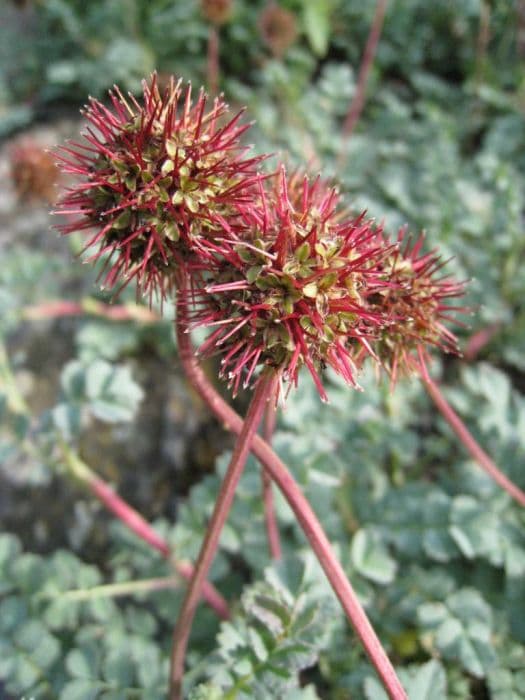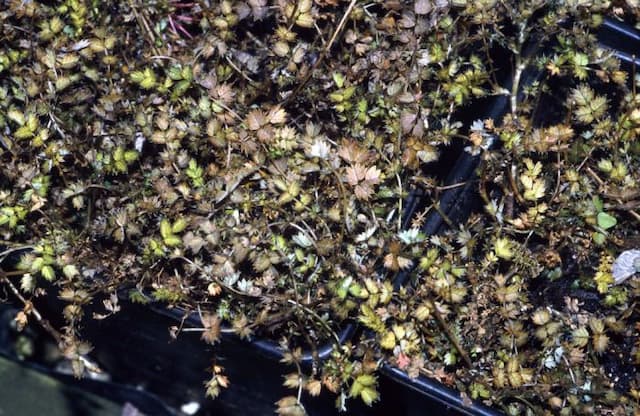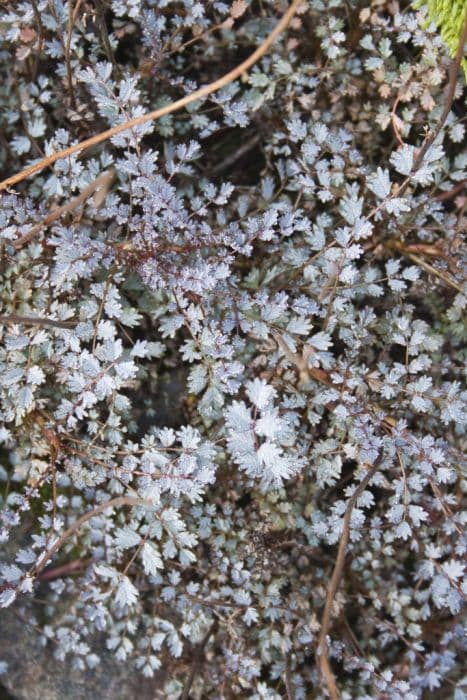White flowering form of water avens Geum rivale 'Album'
ABOUT
The plant known as Geum rivale 'Album', commonly referred to as water avens, is an herbaceous perennial that is characterized by its distinctive nodding blooms. These flowers are pure white, giving it the 'Album' part of its name, which sets it apart from the typical soft pink or peachy hues of other water avens varieties. The white flowers possess a delicate, bell-like shape, with petals that curve upwards slightly at their tips, creating a slightly cupped form. These blooms dangle at the end of slender, wiry stems that emerge from a basal rosette of foliage. The leaves of the water avens are mostly green, often with a subtle reddish tint on the stems or at the edges of the leaves. The foliage is rounded in shape, with the leaves deeply lobed and toothed, giving them a somewhat ruffled appearance. Their texture can be described as somewhat hairy or fuzzy to the touch, which adds to the soft, lush look of the plant. Additionally, the flower stems sprout small, greenish-brown bracts, which contribute to the plant's delicate aesthetic. After the flowering period, the plant produces dry, hairy fruits which may persist on the plant, adding to the visual interest of the water avens even after the blooming season has ended. Overall, Geum rivale 'Album' presents as an elegant and serene addition to shaded or semi-shaded garden spaces, with its cool white blooms standing out among the greenery.
About this plant
 Names
NamesFamily
Rosaceae.
Synonyms
White Flowering Water Avens, White Chocolate, Cream Drops.
Common names
Geum rivale 'Album'.
 Toxicity
ToxicityTo humans
Water avens (Geum rivale 'Album') is generally considered non-toxic to humans. There is no significant evidence to suggest that ingestion of this plant would cause harm or poisoning. Consequently, there are no specific symptoms of poisoning associated with this plant. However, it is generally advisable not to consume any plant unless you are certain of its edibility and lack of toxicity.
To pets
Water avens (Geum rivale 'Album') is not known to be toxic to pets. It should not cause poisoning if ingested by cats, dogs, or other animals typically kept as pets. There are no commonly recognized symptoms of poisoning from this plant as it is not considered poisonous. Nonetheless, it's still a good practice to prevent pets from consuming plants, as individual animals might have sensitivities or allergic reactions.
 Characteristics
CharacteristicsLife cycle
Perennials
Foliage type
Deciduous
Color of leaves
Green
Flower color
White
Height
1-2 feet (30-60 cm)
Spread
1-2 feet (30-60 cm)
Plant type
Herb
Hardiness zones
4
Native area
Europe
Benefits
 General Benefits
General Benefits- Aesthetic Appeal: Geum rivale 'Album', commonly known as Water Avens, boasts delicate white blooms that can enhance the visual interest of any garden space.
- Attracts Pollinators: The flowers of the Water Avens are attractive to bees, butterflies, and other beneficial insects, helping to support local ecosystems.
- Easy to Grow: This plant is known for being low maintenance and easy to care for, which is great for beginner gardeners or those looking for hassle-free landscaping.
- Tolerates Different Conditions: Water Avens is adaptable to various soil types and can handle moist conditions, making it suitable for planting in challenging garden spots.
- Native Species Support: As a native species in some regions, growing Water Avens can contribute to the preservation of local flora and fauna.
- Seasonal Interest: With its season-long foliage and late spring to early summer blooming period, Water Avens provides extended interest in the garden.
- Ground Cover: The plant's growth habit can help in covering bare spots in the garden, thereby reducing weed growth and soil erosion.
- Garden Design Versatility: It can be used in a variety of garden designs, including cottage gardens, rock gardens, and naturalized areas.
- Non-Invasive: Unlike some other plants, Water Avens grows in a controlled manner, reducing the risk of it overtaking other plants in the garden.
- Wildlife Support: Besides pollinators, the seeds of the plant can be a food source for birds, making it a valuable addition to a wildlife-friendly garden.
 Medical Properties
Medical PropertiesThis plant is not used for medical purposes.
 Air-purifying Qualities
Air-purifying QualitiesThis plant is not specifically known for air purifying qualities.
 Other Uses
Other Uses- Groundcover: Geum rivale 'Album', also known as water avens, can be used as an attractive groundcover in shady garden spots due to its foliage and spreading habit.
- Bank Stabilization: This plant's root system helps stabilize stream banks and slopes, preventing soil erosion in wetland areas.
- Wildlife Habitat: Water avens provides shelter and nesting materials for small wildlife, contributing to the biodiversity of the area.
- Nectar Source: The flowers of Geum rivale 'Album' are a source of nectar for bees and other pollinators, supporting the local ecosystem.
- Tannin Source: The roots of water avens can be used as a source of tannins for dyeing fabric or for other tannin-related uses.
- Artistic Inspiration: With its delicate white blooms, Geum rivale 'Album' can serve as a source of inspiration for artists and photographers.
- Educational Tool: This plant can be used in educational settings such as botanical gardens to teach about wetland plant species and their roles in their native habitat.
- Culinary Garnish: While more common in its colored varieties, even the petals of Geum rivale 'Album' can be used to garnish salads and desserts for an elegant touch.
- Companion Planting: The water avens can be planted alongside other moisture-loving perennials to create harmonious wet garden designs.
- Thematic Gardening: Geum rivale 'Album' is suitable for "white gardens" or moon gardens, where it can reflect moonlight and create a luminescent effect at night.
Interesting Facts
 Feng Shui
Feng ShuiThe Water Avens is not used in Feng Shui practice.
 Zodiac Sign Compitability
Zodiac Sign CompitabilityThe Water Avens is not used in astrology practice.
 Plant Symbolism
Plant Symbolism- Purity - The 'Album' in Geum rivale 'Album' indicates a white or pale coloring which often symbolizes cleanliness and innocence.
- Perseverance - Being a hardy plant that can thrive in damp environments, it embodies resilience and the ability to overcome challenging conditions.
- Hidden Beauty - Since Geum rivale, commonly known as Water Avens, tends to grow in less conspicuous areas like wet meadows and stream banks, it can represent unassuming beauty or hidden treasures.
- Balance - The plant's preference for moist habitats can be associated with the equilibrium between land and water, symbolizing the quest for balance in life.
- Healing - Historically, Water Avens had been used in folk medicine, which can make it a symbol of healing and comfort.
 Water
WaterThe Water Avens (Geum rivale 'Album') prefers consistent moisture and should be watered deeply once a week, providing about 1 to 1.5 gallons of water for each plant. During hot or dry weather, watering frequency may increase to twice a week to maintain the soil moisture at a level where it feels moist but not saturated. Always check the top inch of soil before watering; if it’s dry, it’s time to water. Overwatering or allowing the plant to sit in waterlogged soil can lead to root rot, so good drainage is important.
 Light
LightWater Avens thrives best in partial shade, enjoying a position that is shielded from the harsh afternoon sun. Ideal locations would be under dappled light, such as that provided by a canopy of deciduous trees, or on the north or east side of a structure where it can receive bright morning light and escape the intense sun later in the day.
 Temperature
TemperatureWater Avens is hardy and can tolerate a temperature range from about 20°F in winter to 75°F during summer, making it versatile across many climates. The ideal temperature range for this plant is between 60°F and 70°F. Exposing the plant to extremes of heat or cold outside of this range might impede its growth or cause stress.
 Pruning
PruningPrune Water Avens to remove spent flowers and encourage a second bloom, as well as to maintain plant shape and remove any dead or diseased foliage. The best time for pruning is immediately after the first bloom cycle, which generally occurs in late spring or early summer. Pruning periodically throughout the growing season can also help the plant to retain a tidy appearance.
 Cleaning
CleaningAs needed
 Soil
SoilWater Avens thrives in moist, well-drained soil rich in organic matter, with a pH range of 5.5 to 7. To create the best soil mix, combine garden loam, peat or compost, and a small amount of sand for drainage. This will help mimic the plant's natural habitat and provide a good balance of nutrients, aeration, and water retention.
 Repotting
RepottingWater Avens does not generally require frequent repotting as it is a hardy perennial. It can be split or repotted every 3 to 4 years to rejuvenate and divide the clumps if they become too crowded or to propagate new plants.
 Humidity & Misting
Humidity & MistingWater Avens prefers a moderately humid environment as it is native to damp meadows and stream banks. It does not require a high humidity setting when grown outdoors, but it should not be placed in excessively dry conditions for extended periods.
 Suitable locations
Suitable locationsIndoor
Place in a bright spot with indirect light, ensuring soil stays moist.
Outdoor
Choose a partially shaded spot with moist, well-draining soil.
Hardiness zone
4-8 USDA
 Life cycle
Life cycleGeum rivale 'Album', commonly known as white flowering water avens, begins its life as a seed, which germinates in moist, fertile soil typically found in its preferred habitats such as wet meadows or streambanks. Upon germination, the seedling emerges, establishing a small rosette of basal leaves, and as the plant matures, it develops a deep root system that can survive through winter in a perennial fashion. During spring and early summer, it sends up flowering stems that bear nodding, bell-shaped white flowers that are pollinated by insects, leading to the formation of seed heads which disperse seeds and can also propagate vegetatively through their rhizomes. After flowering, the plant's above-ground foliage dies back, but the perennial root system enables it to reemerge and repeat its life cycle the following year. Over time, the plant can form large clumps and spread laterally, effectively colonizing an area and contributing to local ecosystems by providing food for pollinators. In harsh conditions, water avens may enter a period of dormancy until favorable growth conditions return.
 Propogation
PropogationPropogation time
Spring-Early Summer
The most popular method of propagation for the Geum rivale 'Album', commonly known as Water Avens, is by division. This should ideally be done in the spring or autumn. To propagate by division, carefully lift the plant from the ground with a garden fork, ensuring to keep as much of the root system intact as possible. Gently tease the clumps apart, making sure that each section has some of the root system. Replant the divisions at the same depth they were previously growing, spacing them about 12 to 24 inches (30 to 60 centimeters) apart. Water the newly planted divisions well to establish them. Division allows the plant to rejuvenate and can help maintain its vigor, as crowded clumps may lose vitality over time.









